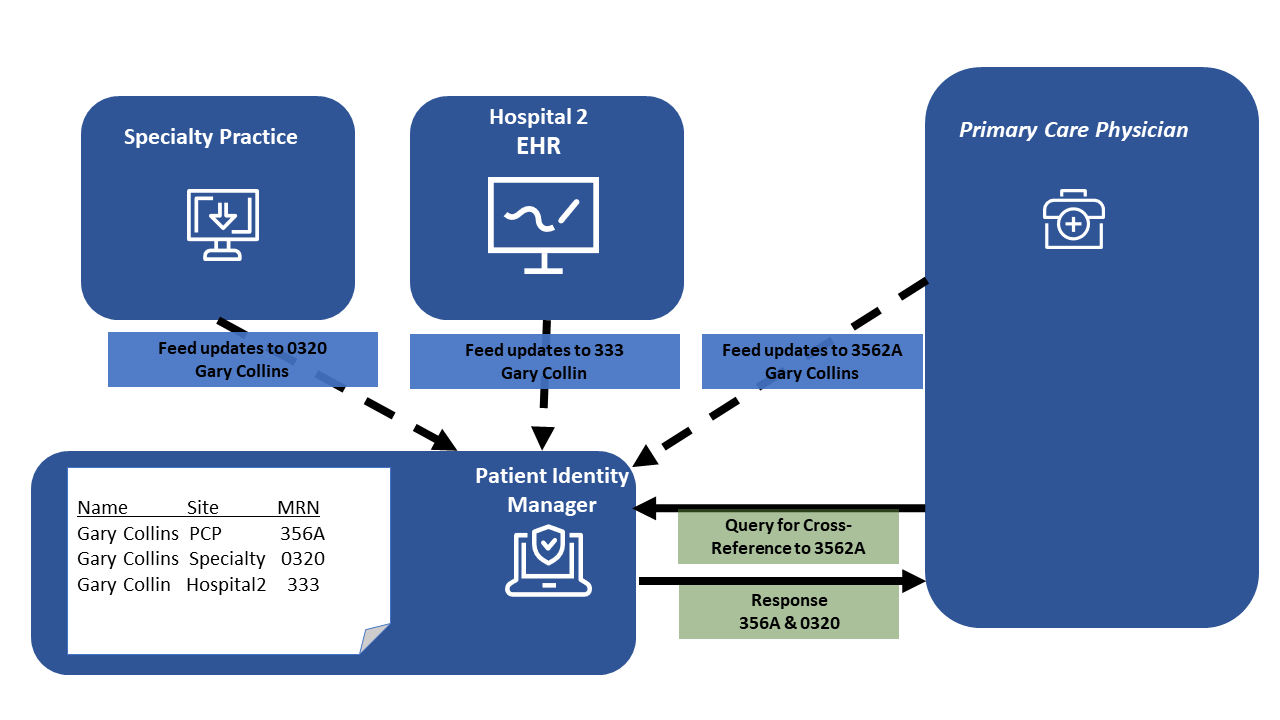Now that IHE has added a PIXm Feed transaction, there is now confusion between PIXm and PMIR. Let me explain.
Overall
The PIXm and PMIR implementation guides are intending on solving two very different models of managing Patient Identity. There is no expectation that a community would deploy both models.- PMIR model is about one master Patient instance;
- PIXm model is about cross-references to identifiers;
PMIR
PMIR model is one where a community wants to cooperate on a master Patient identity for each patient, a "golden" patient. This model has each authoritative party in the community cooperatively keeping the single Patient identity for a patient up-to-date. When a patient is seen one of the locations in the community, the master Patient identity is pulled from the PMIR Registry. If there is anything that needs to be updated, then that system will send the update back to the PMIR Registry. Thus there is only one Patient identity (demographics, addresses, phone numbers, national numbers, etc). This cooperation is what PMIR is all about.
There are additional features in PMIR that enable those that rely on this master Patient instance to be notified of changes. This is another use of the feed. This feed does enable the data custodians to be notified of important changes like when two master identifiers were determined to actually be about the same patient and thus have been merged. In this case the data custodian is expected properly update their data to represent the merge.
PIXm
PIXm model is one where a community wants to cooperate on Cross-References between each community members instance of the Patient identity as they know it. Where a cross-reference is simply a list of Patient.id and Patient.identifier (that is a patient identity such as MRN). The cross-reference is derived at using the other elements in the Patient resource, but a cross-reference does not expose on a query interface these other elements in the Patient resource. The PIXm query is just a set of identifiers (id and identifier) that are cross-referenced.
Each time a community participant updates their local instance of the Patient identity, they do feed those updates to the PIXm Manager. The Manager looks at the details with the ONLY output that the PIXm Manager updates the cross-references that it would return in the future when a PIXm client asks for the cross-references. It is very likely that the PIXm Manager does remember the demographics, addresses, phone numbers, national numbers, etc... but there is no effort to harmonize these at the element level.
PMIR uses PIXm
PMIR does include the PIXm Query transaction. This is useful when a client in the PMIR environment for a very few cases:
1. When the client does not want the whole Patient, just the .id so that it can record that value. There are plenty of client use-cases where it is not important to have access to the full, and sometimes sensitive, elements in the Patient resource. For example a weight scale wanting to record a new body-weight observation, where the scale knows the PMIR Registry and knows that the weight scale GUID is recorded as a Patient.identifier. Thus this device can do a PIXm Query given the scale GUID and get the Patient .id value. It can put that value into the Observation.subject element.
2. When the client does not want the whole Patient, just knows the Patient .id and wants a local MRN value. Not as clear why this client does not want to be exposed to the Patient Demographics, but it is possible.
PIXm and PMIR feed are not compatible
So the above should make it clear that PIXm and PMIR are solving different community models, and that those models would not exist in the same community. It is possible that a PMIR community would want to be a community participating in a broader PIXm community. Thus the PMIR Registry would participate as a PIXm Patient Identity Source.
The elephant in the room is... WHY did PIXm and PMIR feed choose totally different technical approaches at the FHIR interaction? If you didn't notice this, let me explain.
- PMIR uses a "history" Bundle for the Feed.
- PIXm uses more basic RESTful Create/Update/Delete (mostly)

Thanks for the article John! PIXm has proposed the RESTFul approach because it reflects the Usecase for a Patient ID Manager where each feeded patient could be kept as a shadow Patient resource (the thing the Manager remembers for the cross-referencing). So each Update would provide the Patient ID Manager the update on the shadow resource based on the identifier from the Identity Source which in my view fits nicely the proposed API but also looking forward for implementers comment and experiences.
ReplyDeleteI agree. I think the RESTful approach is easier than the message that PMIR is using. This is why I think IHE should look to use the same pattern in a future revision of PMIR. There is a different expected action for a PIXm manager than a PMIR registry.
Delete